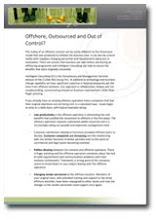A number of organisations are
turning to outsourcing to provide specialist skills for specialist services.
Resourcing is a hugely important part of any business and therefore should be
treated as an area where specialist skills should be used to find and select
the best people in the marketplace for specific positions. I do not believe
that resourcing is treated as a specialist skill and therefore outsourcing
agreements tend to focus on volume and cost rather than quality.
Specialist resourcing organisations are providing services at many of our largest financial services companies. However, in this context, specialist means that the organisation “only” supplies resourcing services and does not refer to the quality or depth of knowledge of the people who provide the services. It is like going to a specialist plumbing company to get new central heating installed but then finding out that the people who work there have little more experience than changing a washer. Why do we have an attitude towards resourcing outsourcing that is so much more tolerant of poor performance than we would have to an IT provider or security firm?
People cannot be treated as insurance claims and processed by computer and semi-skilled resources. Resourcing should be treated as a skilled and professional skill and companies should take this into account when looking for outsource partners.
Specialist resourcing organisations are providing services at many of our largest financial services companies. However, in this context, specialist means that the organisation “only” supplies resourcing services and does not refer to the quality or depth of knowledge of the people who provide the services. It is like going to a specialist plumbing company to get new central heating installed but then finding out that the people who work there have little more experience than changing a washer. Why do we have an attitude towards resourcing outsourcing that is so much more tolerant of poor performance than we would have to an IT provider or security firm?
People cannot be treated as insurance claims and processed by computer and semi-skilled resources. Resourcing should be treated as a skilled and professional skill and companies should take this into account when looking for outsource partners.






